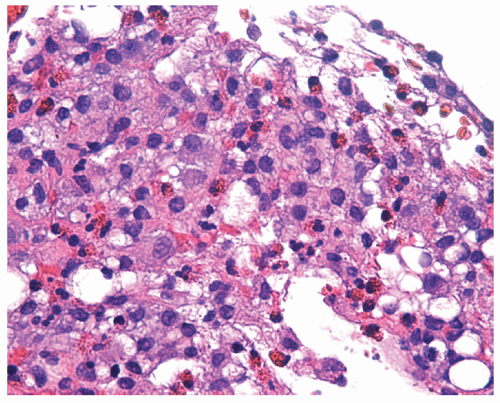Specific Forms of Pleuritis
Alvaro C. Laga
Timothy C. Allen
Philip T. Cagle
Eosinophilic pleuritis is characterized by abundant eosinophils in the pleural tissue and fluid. Eosinophilic pleuritis occurs as a reaction to pneumothorax or hemothorax from a wide variety of causes. Other etiologies of eosinophilic pleuritis include drug reactions and infections (tuberculosis, parasites, fungus, certain bacteria). It is commonly identified in patients undergoing pleurectomy and/or excision of blebs and bullae. In these cases, the eosinophilic pleuritis may be associated with bullae or focal honeycombing of the underlying lung parenchyma. In women of child-bearing age, the underlying lung may be affected by lymphangioleiomyomatosis.
Granulomatous pleuritis may be seen in association with infection (tuberculosis or fungus), sarcoidosis, and Wegener granulomatosis. Foreign-body granulomatous reactions may occur in the pleura as the result of iatrogenic instillation of foreign material into the pleural cavity to cause its obliteration for the purpose of treating recurrent pleural effusions.
Histologic Features
Eosinophilic Pleuritis
Infiltrate of eosinophils in the pleural tissue and fluid may include reactive mesothelial cells, histiocytes, lymphocytes, and giant cells.
Adjacent lung may show focal eosinophilic infiltrates within small vessels.
Underlying lung may show bullae, focal honeycombing, or lymphangioleiomyomatosis.
Granulomatous Pleuritis
Areas of granulomatous inflammation or well-formed granulomas with or without central necrosis.
Special stains for organisms, such as Gomori methenamine silver, are helpful when positive but a negative special stain does not rule out infection.
Foreign material such as talc may be identified on polarized light when deliberately instilled into the pleura to cause fibrosis as a treatment for recurrent pleural effusion.
 Figure 129.1 Pleural fluid in eosinophilic pleuritis with eosinophils and reactive mesothelial cells.
Stay updated, free articles. Join our Telegram channel
Full access? Get Clinical Tree
 Get Clinical Tree app for offline access
Get Clinical Tree app for offline access

|